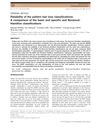 4 citations,
December 2019 in “Minerva Urology and Nephrology”
4 citations,
December 2019 in “Minerva Urology and Nephrology” 5-alpha reductase inhibitors may reduce bladder cancer recurrence and improve survival.
3 citations,
January 2020 in “Indian Journal of Dermatology” Certain gene variations in the Vitamin D Receptor are linked to higher risk of female hair loss.
[object Object]  4 citations,
August 2020 in “Journal of Cosmetic Dermatology”
4 citations,
August 2020 in “Journal of Cosmetic Dermatology” QR 678 and QR678 Neo treatments are effective for hair loss in women with PCOS.
 13 citations,
September 2016 in “Acta Médica Portuguesa”
13 citations,
September 2016 in “Acta Médica Portuguesa” Many adults in Porto have acne, but few know or treat it.
 May 2024 in “Medicine today”
May 2024 in “Medicine today” Older age, family history, and low iron levels increase the risk of female hair loss.
 April 2024 in “Skin research and technology”
April 2024 in “Skin research and technology” Botulinum toxin A has limited effectiveness for 3 months in treating female pattern hair loss and may reduce scalp oiliness.
 May 2024 in “Journal of cosmetic dermatology”
May 2024 in “Journal of cosmetic dermatology” Topical finasteride/minoxidil is effective but not better than oral finasteride for hair loss.
32 citations,
September 2013 in “Breast cancer research” A specific gene variant is linked to a higher risk of hair loss from chemotherapy in breast cancer patients.
 45 citations,
May 2018 in “Stem Cell Research & Therapy”
45 citations,
May 2018 in “Stem Cell Research & Therapy” Using patients' own fat-derived cells to treat alopecia areata significantly improved hair growth and was safe.
 January 2024 in “American journal of clinical dermatology”
January 2024 in “American journal of clinical dermatology” Ritlecitinib is safe and well-tolerated for treating alopecia areata in patients aged 12 and older.
3 citations,
August 2021 in “Journal of Cosmetic Dermatology” Non-ablative Er:YAG laser effectively treats hair loss with high patient satisfaction and no side effects.
 12 citations,
November 2021 in “Journal of Clinical Medicine”
12 citations,
November 2021 in “Journal of Clinical Medicine” Kidney transplant patients who had COVID-19 experienced a significant drop in their quality of life due to long-lasting symptoms.
 9 citations,
May 2021 in “International Journal of Dermatology”
9 citations,
May 2021 in “International Journal of Dermatology” The trial showed that a new under-the-tongue treatment for severe hair loss was somewhat effective in a small group of people.
 16 citations,
March 2015 in “Clinical Cancer Research”
16 citations,
March 2015 in “Clinical Cancer Research” The document concludes that side effects from Smoothened inhibitor drugs for skin cancer are reversible and can be managed with a team approach to maintain quality of life.
 2 citations,
August 2023 in “Marine drugs”
2 citations,
August 2023 in “Marine drugs” Collagen from tilapia scales may improve hair and skin health by reducing stress and inflammation and encouraging hair growth.
January 2018 in “Journal of the advanced practitioner in oncology” Older patients with advanced kidney cancer can be managed with a drug called Sunitinib.
 2 citations,
September 2021 in “Journal of Pharmacopuncture”
2 citations,
September 2021 in “Journal of Pharmacopuncture” Korean medicine may help with hair growth in alopecia, but more research is needed to confirm this.
 6 citations,
January 2016 in “International Journal of Trichology”
6 citations,
January 2016 in “International Journal of Trichology” The conclusion is that more hair loss (androgenetic alopecia) is linked to larger prostate size, suggesting hair loss could be an early sign of benign prostatic hyperplasia.
[object Object] 87 citations,
March 2013 in “Expert Review of Anticancer Therapy” Afatinib often causes skin problems that need proactive management.
 288 citations,
June 2009 in “Human reproduction update”
288 citations,
June 2009 in “Human reproduction update” The modified Ferriman-Gallwey method is a useful tool for diagnosing hirsutism.
 February 2024 in “Journal of ayurveda and integrated medical sciences”
February 2024 in “Journal of ayurveda and integrated medical sciences” Ayurvedic medicine helped increase a young woman's hemoglobin levels and improved her anemia symptoms.
 17 citations,
June 2020 in “British Journal of Dermatology”
17 citations,
June 2020 in “British Journal of Dermatology” Oral mTOR inhibitors often cause skin and hair side effects but usually don't require stopping treatment.
 22 citations,
November 2005 in “BMC Cancer”
22 citations,
November 2005 in “BMC Cancer” Gemcitabine and paclitaxel are effective and safe as first-line treatment for metastatic breast cancer.
 16 citations,
October 2012 in “The Journal of Dermatology”
16 citations,
October 2012 in “The Journal of Dermatology” The BASP classification is more reliable than the Norwood-Hamilton for classifying hair loss in men and women.
 8 citations,
October 2019 in “Dermatologic Therapy”
8 citations,
October 2019 in “Dermatologic Therapy” Bicalutamide improves hair density in women safely.
 67 citations,
April 2018 in “JAMA Dermatology”
67 citations,
April 2018 in “JAMA Dermatology” Hair loss from hormone therapy in breast cancer patients can be improved with minoxidil treatment.
 52 citations,
May 2017 in “Journal of Cosmetic Dermatology”
52 citations,
May 2017 in “Journal of Cosmetic Dermatology” PRP injections improve hair density and thickness in women with hair loss.
 15 citations,
July 2019 in “Lasers in surgery and medicine”
15 citations,
July 2019 in “Lasers in surgery and medicine” The erbium-glass laser effectively promotes hair regrowth in alopecia areata.
 8 citations,
October 2018 in “Dermatologic Therapy”
8 citations,
October 2018 in “Dermatologic Therapy” About 41% of Indian hair loss patients have low enzyme activity that affects hair loss treatment effectiveness, with men affected more than women. Testing for this can guide treatment.
 7 citations,
October 2019 in “Annals of palliative medicine”
7 citations,
October 2019 in “Annals of palliative medicine” New targeted cancer drugs can cause skin side effects, and managing them requires patient education and timely care.

























